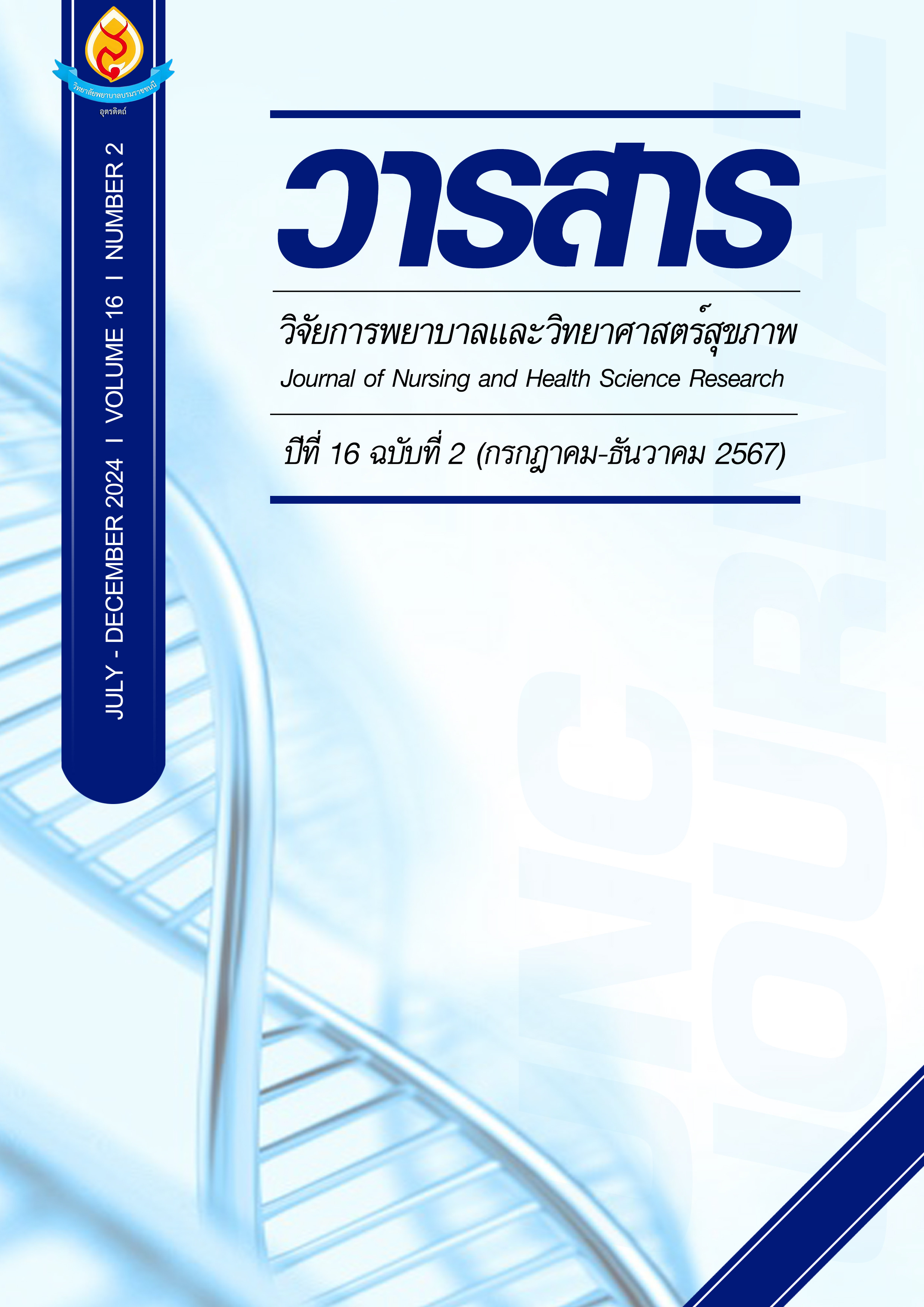ผลของโปรแกรมส่งเสริมความแข็งแกร่งในชีวิตต่อความเครียด ของญาติผู้ดูแลผู้ที่มีภาวะสมองเสื่อม
Main Article Content
บทคัดย่อ
การวิจัยกึ่งทดลองนี้มีวัตถุประสงค์เพื่อศึกษาผลของโปรแกรมส่งเสริมความแข็งแกร่งในชีวิต ต่อความเครียดของญาติผู้ดูแลผู้ที่มีภาวะสมองเสื่อม กลุ่มตัวอย่างประกอบด้วยญาติผู้ดูแลผู้ที่มีภาวะสมองเสื่อมที่มาเข้ารับบริการในแผนกผู้ป่วยนอก โรงพยาบาลจิตเวชแห่งหนึ่ง สังกัดกรมสุขภาพจิต จังหวัดเชียงใหม่ จำนวน 18 คน แบ่งเป็นกลุ่มทดลองและกลุ่มควบคุม กลุ่มละ 9 คน เครื่องมือการวิจัยประกอบด้วยโปรแกรมส่งเสริมความแข็งแกร่งในชีวิตต่อความเครียดของญาติผู้ดูแลผู้ที่มีภาวะสมองเสื่อม แบบวัดการรับรู้ความเครียด มีค่าความเชื่อมั่น .88 แบบประเมินความแข็งแกร่งในชีวิต มีค่าความเชื่อมั่น .89 และแบบสอบถามข้อมูลส่วนบุคคล ดำเนินการทดลองและเก็บรวบรวมข้อมูลในช่วงเดือนธันวาคม 2566 ถึงกุมภาพันธ์ 2567 วิเคราะห์ข้อมูลด้วยสถิติความถี่ ร้อยละ ค่าเฉลี่ย และส่วนเบี่ยงเบนมาตรฐาน Chi-Square Test, Fisher exact Probability Test, Paired Sample t-Test, Mann - Whitney U Test
ผลการวิจัยพบว่า 1) คะแนนเฉลี่ยความเครียดของญาติผู้ดูแลผู้ที่มีภาวะสมองเสื่อมหลังได้รับโปรแกรมส่งเสริมความแข็งแกร่งในชีวิต 1 เดือน ต่ำกว่าก่อนได้รับโปรแกรมส่งเสริมความแข็งแกร่งในชีวิตอย่างมีนัยสำคัญทางสถิติที่ระดับ .05 และ 2) คะแนนเฉลี่ยความเครียดของญาติผู้ดูแลผู้ที่มีภาวะสมองเสื่อมในกลุ่มที่ได้รับโปรแกรมส่งเสริมความแข็งแกร่งในชีวิตต่ำกว่ากลุ่มที่ได้รับการดูแลตามปกติอย่างมีนัยสำคัญทางสถิติที่ระดับ .05
ดังนั้นผลการวิจัยนี้แสดงให้เห็นว่าโปรแกรมส่งเสริมความแข็งแกร่งในชีวิตสามารถลดความเครียดของญาติผู้ดูแลผู้ที่มีภาวะสมองเสื่อมได้
Article Details

อนุญาตภายใต้เงื่อนไข Creative Commons Attribution-NonCommercial-NoDerivatives 4.0 International License.
บทความหรือข้อคิดเห็นใดใดที่ปรากฏในวารสารวิจัยการพยาบาลและวิทยาศาสตร์สุขภาพ เป็นวรรณกรรมของผู้เขียน ซึ่งบรรณาธิการหรือสมาคมศิษย์เก่า ไม่จำเป็นต้องเห็นด้วย และบทความที่ได้รับการตีพิมพ์เผยแพร่ถือเป็นลิขสิทธิ์ของวารสารวิจัยการพยาบาลและวิทยาศาสตร์สุขภาพ
เอกสารอ้างอิง
Alzheimer's Association. (2018). 2018 Alzheimer's disease facts and figures. Alzheimer's & Dementia, 14(3), 367-429.
Alzheimer's Association. (2023). Alzheimer’s disease facts and figures. Created with data from the Alzheimer’s association. Retrived (2023, January 22). from https://www.alz.org/media/documents/alzheimers-facts-and-figures.pdf
Bang, M. & Kim, O. (2016). Effect of the family resilience reinforcement program for family caregivers of the elderly with dementia. Korean Journal of Adult Nursing, 28(1), 71-82.
Chirawatkul, A. (2015). Health science statistics for research (4th ed.). Bangkok: S. Asia Press Co., Ltd. (in Thai).
Cohen, J. (1988). Statistical power analysis for the behavioural sciences. (2nd ed.). Hillsdale, NJ: Lawrence Erlbaum Associates.
Cohen, S., Kamarck, T. & Mermelstein, R. (1994). Perceived stress scale. Measuring stress: a guide health and social scientists, 10(2), 1-2.
Fernandez-Calvo, B., Castillo, I. C., Campos, F. R., Carvalho, V. M. D. L., Silva, J. C. D. & Torro Alves, N. (2016). Resilience in caregivers of persons with Alzheimer's disease: a human condition to overcome caregiver vulnerability. Estudos de Psicologia (Natal), 21, 125-133.
Fong, T. K. H., Cheung, T., Chan, W. C. & Cheng, C. P. W. (2022). Depression, anxiety, and stress on caregivers of persons with dementia (CGPWD) in Hong Kong amid COVID-19 pandemic. International Journal of Environmental Research and Public Health, 19(1), 184.
Ghaffari, F., Rostami, M., Fotokian, Z. & Hajiahmadi, M. (2019). Effectiveness of resilience education in the mental health of family caregivers of elderly patients with alzheimer’s disease. Iranian Journal of Psychiatry and Behavioral Sciences, 13(3), e695074.
Ghezelsefloo, M., Saadati, N., Yousefi, Z. & Zamanpour, M. (2019). Study the effect of resilience training on reducing stress and communication problems in the primary caregivers of the elderly with alzheimer disease. Iranian Journal of Ageing, 14(3), 284-297.
Grotberg, E. H. (1995). A guide to promoting resilience in children: strengthening the human spirit. The Hague, Netherlands: Bernard van leer foundation.
International Psychiatric Association. (1996). Complete guides to behavioral psychological symptoms of dementia. Retrived (2022, December 10). from http://www.ipa-online.org/publications/guide-to-bpsd.
Kaewsakultong, S. & Kaewsakultong, C. (2024). The effect of a mental health empowerment program to reduce burnout for caregivers of dependent elderly in Chai Buri district, Surat Thani province. Academic Research and Innovation, 1(1), 1-12. (in Thai).
Lagana, V., Bruno, F., Altomari, N., Bruni, G., Smirne, N., Curcio, S., ... & Maletta, R. (2022). Neuropsychiatric or behavioral and psychological symptoms of dementia (BPSD): focus on prevalence and natural history in alzheimer's disease and frontotemporal dementia. Frontiers in Neurology, 13, 832199.
Lazarus, R. S. & Folkman, S. (1984). Stress, appraisal and coping. Springer publishing company.
Liu, C. C., Lee, C. F., Chang, T. & Liao, J. J. (2020). Exploring the relationship between the caregiver’s stress load and dementia patient behavior: a case study of dementia specialist outpatient data from the Southern medical center of Taiwan. International Journal of Environmental Research and Public Health, 17(14), 4989.
Liu, R., Chi, I. & Wu, S. (2022). Caregiving burden among caregivers of people with dementia through the lens of intersectionality. The Gerontologist, 62(5), 650-661.
Mekawichai, P. & Saetang, S. (2013). Caregiver burden among Thai dementia patients’caregivers. Journal of the Psychiatric Association of Thailand, 58, 101-110. (in Thai).
Nintachan, P., Sangon, S. & Thaweekoon, T. (2012). The resilience enhancement program. Thai Population Development Project, Faculty of Medicine Ramathibodi Hospital, Mahidol University, Bangkok: Chutthong. (in Thai).
Phuttharod, P. & Lakkanasirorat, M. (2022). The effectiveness of resilience enhancing programon resilience quotients and depressive symptoms in a schizophrenia patients caregiver. The Journal of Psychiatric and Mental Health Nursing, 36(3), 1-13. (in Thai).
Sasat, S. (2003). Nursing care for patients with dementia and management, teaching materials for advanced geriatric nursing II. Bangkok: Faculty of Nursing, Chulalongkorn University. (in Thai).
Schoenmakers, B., Buntinx, F. & Delepeleire, J. (2010). Factors determining the impact of care-giving on caregivers of elderly patients with dementia. A systematic literature review. Maturitas, 66(2), 191-200.
Suvanayos, C. & Thapinta, D. (2020). Reducing stress in caregivers of people with dementia. Journal of Psychiatric and Mental Health Nursing, 34(2), 1-17. (in Thai).
Tabtim, D. & Intarakamhang, U. (2020). Resilience enhancement program on caregiver behavior for elderly diabeites melliutus patients: Mixed methods research. (phd’s thesis). Srinakharinwirot University. (in Thai).
Tossungnoen, B., Tungpunkom, P. & Sethabouppha, H. (2021). The effect of a resilience enhancement program on the stress of students preparing for university entrance exams during the COVID-19 pandemic. Journal of Psychiatric and Mental Health Nursing, 35(3), 170-185. (in Thai).
Verma, S., Sayal, A., Vijayan, V. K., Rizvi, S. M. & Talwar, A. (2016). Caregiver’s burden in pulmonary arterial hypertension: a clinical review. Journal of exercise rehabilitation,12(5), 386.
Wongpakaran, N. & Wongpakaran, T. (2010). The Thai version of the PSS-10: an investigation of its psychometric properties. BioPsychoSocial Medicine, 4(1), 1-6.
World Health Organization. (2021). Dementia. Retrived (2023, January 22). from https://www.who.int/news-room/fact-sheets/detail/dementia
Zarit, S. H., Reever, K. E. & Bach-Peterson, J. (1980). Relatives of the impaired elderly: correlates of feelings of burden. The gerontologist, 20(6), 649-655.
Zucca, M., Isella, V., Lorenzo, R. D., Marra, C., Cagnin, A., Cupidi, C., ... & SINdem COVID-19 Study Group. (2021). Being the family caregiver of a patient with dementia during the coronavirus disease 2019


